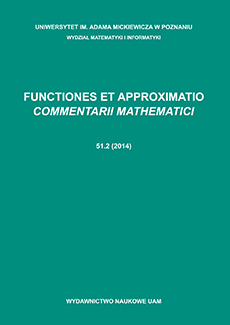Abstract
Let $q, m\geq 2$ be integers with $(m,q-1)=1$. Denote by $s_q(n)$ the sum of digits of $n$ in the $q$-ary digital expansion. Further let $p(x)\in \mathbb{Z}[x]$ be a polynomial of degree $h\geq 3$ with $p(\mathbb{N})\subset \mathbb{N}$. We show that there exist $C=C(q,m,p)>0$ and $N_0=N_0(q,m,p)\geq 1$, such that for all $g\in\mathbb{Z}$ and all $N\geq N_0$, $$\#\{0\leq n< N: s_q(p(n))\equiv g \bmod m\}\geq C N^{4/(3h+1)}.$$ This is an improvement over the general lower bound given by Dartyge and Tenenbaum (2006), which is $C N^{2/h!}$.
Citation
Thomas Stoll. "The sum of digits of polynomial values in arithmetic progressions." Funct. Approx. Comment. Math. 47 (2) 233 - 239, December 2012. https://doi.org/10.7169/facm/2012.47.2.7
Information





